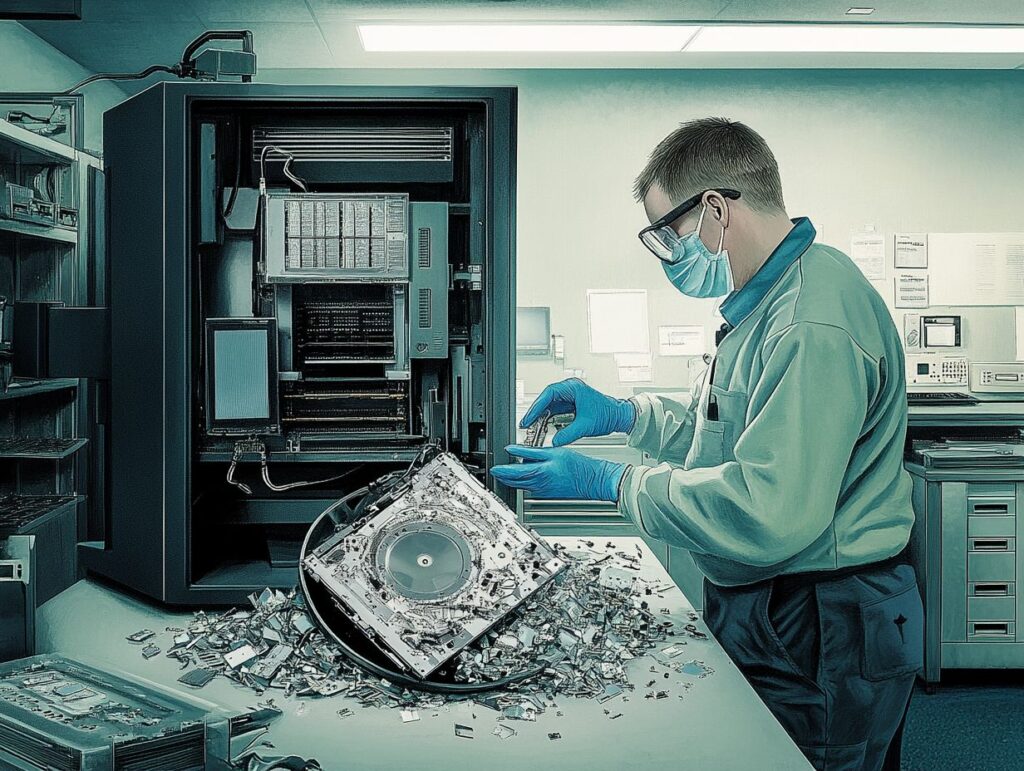Protecting personal data has never been more critical. Old hard drives can harbour sensitive information, making proper disposal essential to prevent identity theft and data breaches.
This article explores the significance of hard drive shredding, highlighting the differences between on-site and off-site services. It guides you through the shredding process, its benefits, and what to consider when choosing a professional service.
Learn how to prepare your hard drive and dispose of shredded materials responsibly. Dive in to safeguard your information and gain peace of mind!
Understanding the Importance of Hard Drive Shredding

Understanding the significance of hard drive shredding is essential for both individuals and businesses seeking to protect sensitive information from unauthorised access. Considering increasing concerns regarding identity theft and data breaches, the secure destruction of personal and confidential data stored on hard drives has become a critical practice.
Effective data protection not only ensures compliance with privacy regulations but also mitigates potential risks associated with data loss. Additionally, responsible electronic waste disposal enhances environmental compliance and reinforces the overall integrity of data privacy measures implemented by individuals and organisations.
Why Proper Disposal of Hard Drives is Critical
The proper disposal of hard drives is essential to prevent data breaches and to ensure that sensitive information does not fall into unauthorised hands. Discarding hard drives without adequate destruction exposes them to potential access by malicious entities, thereby posing significant risks to personal data security and corporate confidentiality.
Inadequate data handling practices can lead to severe complications, including identity theft, financial loss, and potential legal repercussions for organisations that are found negligent in their duty to protect client information.
Advanced methods for hard drive destruction, such as shredding and data sanitisation, are critical in securing sensitive data. Shredding physically destroys the hard drive, rendering data retrieval virtually impossible, while sanitisation involves overwriting existing data multiple times to ensure it cannot be recovered.
By implementing these measures, businesses can not only comply with data protection regulations but also foster trust among their clients, reaffirming their commitment to safeguarding personal information.
Types of Residential Hard Drive Shredding Services
Various types of residential hard drive shredding services are available, designed to meet the diverse needs of individuals who seek to ensure data privacy and security. These services range from on-site shredding to off-site options, offering effective solutions for secure data destruction while enhancing identity protection and compliance with privacy regulations.
Selecting the appropriate shredding method can play a crucial role in mitigating personal risks associated with data breaches and identity theft.
On-Site vs. Off-Site Shredding
The decision between on-site and off-site hard drive shredding plays a crucial role in shaping an organisation’s data security strategy. On-site shredding facilitates immediate destruction of hard drives at the client’s location, thereby ensuring confidentiality is upheld throughout the process. In contrast, off-site shredding entails the secure transportation of hard drives to a designated facility where they are shredded, often equipped with additional machinery to accommodate high-volume needs.
Both options present distinct advantages and disadvantages that warrant careful consideration. On-site shredding offers exceptional convenience and peace of mind, as clients have the opportunity to observe the entire process, thereby reinforcing their trust in the security measures implemented. However, this option may incur higher costs due to the associated logistical requirements.
Conversely, off-site shredding may prove to be more cost-effective and is frequently preferred for larger volumes of data. Nevertheless, it requires stringent security protocols during transportation to ensure the integrity of sensitive information is maintained. Many shredding services also provide confidentiality agreements to further assure clients that their data will be handled responsibly throughout the entire process.
How Hard Drive Shredding Works

The hard drive shredding process entails a series of systematic steps specifically designed to ensure secure data destruction and eliminate any possibility of data recovery.
By employing advanced shredding equipment, hard drives are physically destroyed, rendering the data irretrievable and enabling effective IT asset disposal.
This secure data destruction method is essential for maintaining data integrity and safeguarding against unauthorised access to sensitive information, thereby strengthening data privacy measures.
The Shredding Process and Equipment Used
The shredding process employs specialised equipment that conforms to rigorous shredding standards, ensuring that hard drives are rendered entirely unreadable and irretrievable. High-security shredding methods are utilised to ensure compliance with data destruction regulations, providing clients with a data destruction certificate as evidence of secure shredding.
These systems vary in capability, with some specifically designed to handle larger volumes while maintaining precise shredding sizes to prevent data reconstruction. By adhering to industry-specific shredding regulations, businesses can effectively minimise the risk of data breaches and protect themselves from legal repercussions.
The issuance of data destruction certificates is essential for reinforcing client trust, serving as a tangible assurance that sensitive information has been managed with the highest levels of care and diligence. This level of accountability is critical in today’s data-driven environment, where the protection of personal and corporate information remains of utmost importance.
Benefits of Using a Professional Shredding Service

Utilising a professional shredding service provides numerous advantages that greatly enhance data security and compliance for both individuals and organisations. These services not only facilitate the secure destruction of hard drives and documents but also assist in managing the risks associated with data breaches and identity theft.
By adhering to stringent shredding regulations and best practices in business compliance, professional shredding services play a critical role in fostering a safer digital environment.
Data Security and Compliance
Data security and compliance are critical in today’s digital landscape, where stringent privacy regulations dictate how organisations manage sensitive information. Professional shredding services play an essential role in upholding data governance practices, assisting businesses in aligning with shredding standards and effectively meeting their compliance requirements.
As organisations endeavour to protect themselves and their clients, the significance of adhering to privacy regulations is paramount. Violating these standards poses risks not only in terms of fines but also jeopardises customer trust.
By employing reliable shredding services, businesses demonstrate their commitment to safeguarding confidential data throughout its lifecycle. This practice indicates that organisations are not only compliant but also proactive in mitigating the risks associated with potential data breaches.
Maintaining high shredding standards contributes to more comprehensive data governance strategies, enhancing an organisation’s overall security posture and assuring clients that their information is managed with the utmost care and responsibility.
Convenience and Peace of Mind
One of the significant advantages of utilising professional shredding services is the convenience they provide, allowing individuals and businesses to securely dispose of sensitive data without unnecessary complications. This assurance is invaluable, as clients can have confidence that their personal information will be managed with the highest level of confidentiality through secure shredding methods.
These services not only guarantee that documents are destroyed in accordance with data protection laws, but they also enhance customer trust by demonstrating a commitment to safeguarding privacy. Options such as remote shredding services offer additional flexibility, enabling businesses to have their documents shredded on-site, thereby eliminating the need for transportation and providing immediate reassurance.
By incorporating such solutions into their data management practices, organisations can create a seamless experience that prioritises security, fostering stronger relationships with their customers and instilling confidence that sensitive information is being handled responsibly.
Steps to Take Before and After Shredding
Implementing the appropriate procedures before and after the shredding process is crucial for maximising data loss prevention and ensuring the secure handling of sensitive information. Adequately preparing a hard drive for shredding can substantially improve the efficacy of data destruction.
Furthermore, being informed about disposal options for shredded materials is essential for maintaining compliance with environmental regulations.
Preparing Your Hard Drive for Shredding
Preparing a hard drive for shredding entails several critical steps to ensure that data recovery is entirely precluded and that the shredding process is conducted effectively. This preparation may involve hard drive encryption and appropriate data handling measures to safeguard sensitive information prior to destruction.
Before sending the hard drive for shredding, it is essential to perform data wiping using secure erasure tools designed to overwrite stored data multiple times, rendering it irretrievable.
Subsequently, verifying the effectiveness of the data destruction is of utmost importance; engaging third-party services with reputable certifications can enhance trust in the process.
Hard drive encryption serves as a robust barrier, bolstering the security of data during transit and storage prior to shredding.
Implementing these strategies not only protects sensitive information but also exemplifies a commitment to data privacy, which is increasingly crucial in today’s digital environment.
Properly Disposing of Shredded Materials
Proper disposal of shredded materials is essential to ensure responsible practices and compliance with waste management regulations. Following the shredding process, it is imperative to utilise environmentally compliant methods for handling the remnants of destroyed hard drives.
Neglecting this critical step may result in environmental hazards and legal repercussions for businesses. Organisations should prioritise collaboration with certified recycling companies that specialise in the responsible treatment of shredded materials.
These partnerships not only enhance compliance with local and national regulations but also support broader sustainability efforts. By incorporating eco-friendly strategies into waste management practices, organisations can cultivate a culture of responsibility within the workplace.
By adopting these best practices, businesses can substantially reduce their carbon footprint, promote recycling initiatives, and contribute to a more sustainable future for the planet.
Choosing the Right Hard Drive Shredding Service

Selecting an appropriate hard drive shredding service is a critical decision that can significantly affect data security and privacy. It is essential to choose a reputable shredding company that prioritises customer privacy and provides cost-effective shredding solutions.
This approach ensures effective data protection and compliance with relevant regulations.
Factors to Consider and Questions to Ask
When evaluating a hard drive shredding service, it is imperative to consider several key factors and pose pertinent questions to ensure that the service aligns with your data security requirements. Inquiries regarding the shredding standards adhered to by the company are essential, as well as whether they provide a data destruction certificate as evidence of compliance.
A critical aspect to evaluate is the company’s adherence to industry regulations, such as the standards set forth by the National Association for Information Destruction (NAID), which mandates safe and environmentally responsible shredding practices.
Potential clients should also examine the company’s methods for tracking and reporting the shredding process, as maintaining a documented chain of custody bolsters trust. Understanding how the service manages confidential materials throughout the entire procedure—from collection to final destruction—is equally crucial.
By taking these considerations into account, individuals and businesses can make informed decisions that prioritize the security of their sensitive information and ensure proper data destruction.
Frequently Asked Questions
What are residential hard drive shredding services?
Residential hard drive shredding services are professional services that securely destroy the data stored on your personal computer’s hard drive. This process ensures that your personal data cannot be retrieved or accessed by anyone.
Why is it important to protect my personal data?
Personal data includes sensitive information such as bank account numbers, social security numbers, and personal documents. If this information falls into the wrong hands, it can lead to identity theft and other forms of fraud. Therefore, it is essential to protect your personal data from potential threats.
How does the shredding process work?
During the shredding process, a professional company will use specialised equipment to physically destroy the hard drive, making it impossible to retrieve any data. The pieces are then recycled, ensuring that the information is permanently destroyed.
Who can benefit from residential hard drive shredding services?
Anyone who has a personal computer or laptop with sensitive information stored on its hard drive can benefit from these services. This includes individuals, families, and small businesses.
Can I trust a third-party company with my personal data?
Yes, it is crucial to choose a reputable and trustworthy company for your residential hard drive shredding services. Look for companies that have proper certifications and a track record of securely handling sensitive information.
What happens to the shredded hard drive?
After the hard drive is shredded, the pieces are typically recycled to reduce electronic waste. This ensures that not only is your personal data protected, but you are also contributing to a more sustainable environment.

